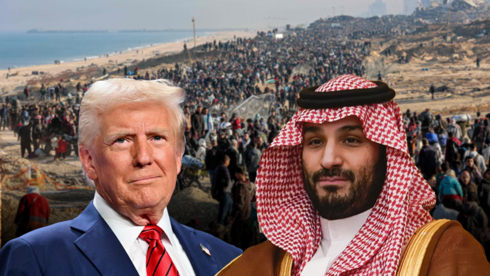3 View gallery


U.S. President Donald Trump, Saudi Crown Prince Mohammed bin Salman
(Photo: Nathan Howard, AP, Omar AL-QATTAA / AFP)
Then the war in Gaza broke out and shows no signs of ending. In response, the Saudis toughened their public demands for normalization, while Israel refuses to compromise on the Palestinian issue.
The resulting deadlock has made progress toward normalization difficult, forcing Washington and Riyadh to advance bilateral understandings and agreements that were once meant to be part of a larger Israeli-Saudi deal.
This week, the U.S. secretary of energy visited Saudi Arabia and told local media that the two countries would soon sign a broad memorandum of understanding covering all areas of energy, to be followed by a formal agreement for nuclear cooperation.
These statements should serve as a wake-up call for Israel’s leadership. The U.S. has broader strategic interests — beyond Hamas, beyond Israel. Israel’s Institute for National Security Studies warned a year ago that Washington might pursue deeper ties with Riyadh without normalization between Israel and Saudi Arabia.
As the institute wrote, Israel risks ending up with nothing: no normalization, while still bearing the dangers of a Saudi nuclear program.
The Saudis, for their part, have strong incentives to bypass normalization. They stand to gain a wide array of benefits from the U.S. — advanced weapons, AI, technology, a security agreement and nuclear cooperation — without paying the political price in the Arab world that would come with openly warming ties with Israel. For them, it’s the best of all worlds. For us, it’s the worst.
On a more positive note, it appears the U.S. has reached a compromise with the Saudis on the issue of uranium enrichment on Saudi soil — long a sticking point. According to the energy secretary, the two sides will sign a “123 Agreement,” which would make it harder for the Saudis to pivot to a military nuclear program in the future.
However, he won’t be able to declare progress on normalization — that depends on ending the war in Gaza.
Israel has a vital interest in advancing normalization with Saudi Arabia. But time is not on our side. Without realizing it, we may be watching that window of opportunity quietly slip away.
Dr. Yoel Guzansky, formerly of Israel’s National Security Council, heads the Gulf Program at the Institute for National Security Studies and is a senior fellow at the Middle East Institute in Washington.

